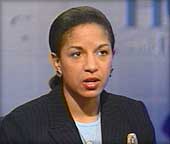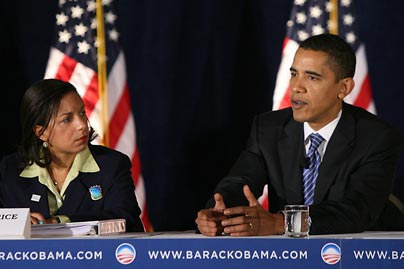Susan Rice poised for role in Obama White House, Darfur backround a plus
One person I’ve been following throughout the election is Susan Rice. I caught up with her briefly at the DNC Convention in the bowels of the Pepsi Center but she didn’t have a whole lot to say. Rice was one of Obama’s Senior Foreign Policy advisers during the presidential campaign.
The 43 year old Rice was an assistant Secretary of State with key experience in African Affairs in the Clinton Administration. She is considered a protégé of Madeleine Albright. In Democratic circles Rice is referred to as “our Dr. Rice” to distinguish her from the current leader of the State Department.
Susan Rice is currently on leave from the Brookings Institution in Washington, DC, where she is a Senior Fellow in the Foreign Policy Studies Program. In addition, she earned an undergraduate degree from Stanford and both a master’s degree and a doctorate in international relations from New College at Oxford University where she was a Rhodes Scholar.
Rice has been mentioned by the New York Times as a possibility to serve as Obama’s deputy national security adviser or or ambassador to the United Nations.
Rice has been accused by some of making off the cuff remarks viewed as naive policy positions. It would be great to see this Rice hold a position like National Security Adviser, but we’ll have to see if Obama feels she is ready for such a task.
Her background in Africa yields some interesting opinions with regards to Darfur.
Since the end of the Clinton administration, Ms. Rice has written often about a range of issues, and particularly the genocide in Darfur. She has pushed a much more aggressive American position on Sudan, including the possible use of military force in 2005 and 2006. She has backed off that position to some extent, saying efforts should now be focused on beefing up and deploying a joint United Nations-African Union peacekeeping force, which the Sudanese government has resisted. “I think the challenge is somewhat different today, and the prescription at the moment is somewhat different,” she said.
Testifying before the Senate Foreign Relations Committee on April 11, 2007, in favor of authorizing United States military action against Sudan if the genocide in Darfur continued: “Some argue that it is unthinkable in the current context. True, the international climate is less forgiving than it was in 1999 when we acted in Kosovo. Iraq and torture scandals have left many abroad doubting our motives and legitimacy. Some will reject any future U.S. military action, especially against an Islamic regime, even if purely to halt genocide against Muslim civilians. Sudan has also threatened that Al Qaeda will attack non-African forces in Darfur — a possibility since Sudan long hosted bin Laden and his businesses.
“Yet, to allow another state to deter the U.S. by threatening terrorism would set a terrible precedent. It would also be cowardly and, in the face of genocide, immoral.
The Bush administration has remonstrated for five years about the genocide in Darfur. Yet we have imposed only the mildest of sanctions, and we have given only lip service to standing up a [joint] African Union-United Nations force.
The imperative has to be to pressure the regime to stop the killing, and to allow the A.U.-U.N. force to deploy effectively. The second part of the challenge is to help the U.N.-African Union with the resources it needs to be an effective force. Right now, it doesn’t have [enough] troops, it doesn’t have helicopters, night vision.
That’s not to say the U.S. needs to make a military contribution. There’s much we can do to support the deployment of effective forces from other countries. [But in general] what we’ve been lacking is a willingness to recognize that in addition to our substantial humanitarian and moral interest in Africa, we have serious security and strategic interests.
One thing you have to say about ‘W’, he appointed African-Americans to some key positions in his staff. He outdid his predecessor Bill Clinton in that regard who placed African-Americans in his cabinet but none with as much responsibility as Rice and Colin Powell. This was one of the few bright spots in his 8 pitiful years in office. It remains to be seen where President Elect Obama will go in this regard.








